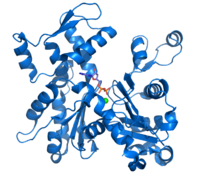
Photo from wikipedia
The aim of this study was to elucidate the effects of iodine-131 on the induction of apoptosis in human cardiac muscle cells and the underlying molecular mechanisms. We found that… Click to show full abstract
The aim of this study was to elucidate the effects of iodine-131 on the induction of apoptosis in human cardiac muscle cells and the underlying molecular mechanisms. We found that iodine-131 reduced cell proliferation, induced apoptosis, induced p53, PIDD, t-BID (mitochondria) protein expression, suppressed cytochrome c (mitochondria) protein expression, and increased Bax protein expression, and promoted caspase-2, -3 and -9 expression levels in human cardiac muscle cells. Meanwhile, si-p53 inhibited the effects of iodine-131 on the reduction in cell proliferation and induction of apoptosis in human cardiac muscle cells through regulation of Bax/cytochrome c/caspase-3 and PIDD/caspase‑2/t-BID/cytochrome c/caspase-3 signaling pathway. After si-Bax reduced the effects of iodine-131, it reduced cell proliferation and induced apoptosis in human cardiac muscle cells through the cytochrome c/caspase-3 signaling pathway. However, si-caspase-2 also reduced the effects of iodine-131 on the reduction of cell proliferation and induction of apoptosis in human cardiac muscle cells through the t-BID/cytochrome c/caspase-3 signaling pathway. These findings demonstrated that iodine-131 induces apoptosis in human cardiac muscle cells through the p53/Bax/caspase-3 and PIDD/caspase-2/t-BID/cytochrome c/caspase-3 signaling pathway.
Journal Title: Oncology reports
Year Published: 2017
Link to full text (if available)
Share on Social Media: Sign Up to like & get
recommendations!